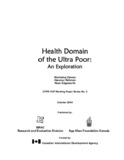| dc.description.abstract | There has been an increasing amount of materials surrounding health-seeking behaviour in recent years. However, a relatively small proportion of literature has focused upon health behaviours and types of health services used by the poor in rural Bangladesh, particularly ultra-poor households. This study aimed to explore the health domain of the ultra-poor, including perceptions of ill health, knowledge and treatment-seeking behaviours in conjunction with the rationale behind these decisions. Data were collected through qualitative methods from the TUP members and their husbands or eldest sons in three villages within Nilphamari district. Findings indicate the regressive nature of burdens associated with ill health carry a number of similar impacts upon TUP members compared to other poor households in Bangladesh and the developing world. Within this concept, the ultra poor’s experience of ill health is compounded by financial and time constraints, lack of health education and awareness of treatment facilities for particular diseases, and cultural rationality in the selection of health care providers. Furthermore, a strong prevalence for self-care methods was recorded for the majority of illness episodes along with traditional healers such as Kabiraj. Consequently, further research should explore integrating these health providers into BRAC interventions within the CFPR/TUP program in order to strengthen the existing medical system, ensuring the burden of ill health is minimized for the ultra-poor. | en_US |

